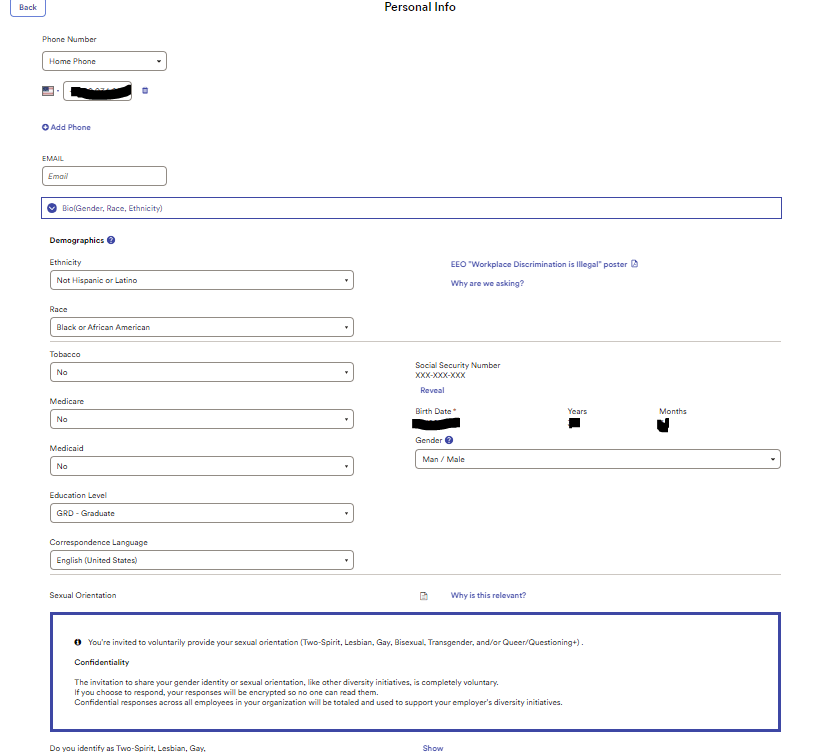Please join our Benefits Services Webinar on June 5th at 11am! This will be held on zoom (please see link below). To RSVP, please visit supportinc.com/calendar
- (303) 340-0322
- info@supportinc.com
- Mon - Thurs: 8:00am - 6:00pm
- News & Updates
Please join our Benefits Services Webinar on June 5th at 11am! This will be held on zoom (please see link below). To RSVP, please visit supportinc.com/calendar
When Patrick was younger, doctors told his family that he would never be able to show emotion or smile. As you can see from the photos, Patrick proved them wrong!
Every year since he was a kid, Patrick has attended Adam’s Camp. He knows everyone there and they all know him. It is one of Patrick’s favorite places to be, and it always puts a smile on his face. This year, he got to spend some time in the mountains and enjoy a gondola ride, go swimming with his favorite camp counselor, and even help make some music for everyone.
Patrick’s family caregivers, Kelly and Steve, know how important camp is to Patrick and always make sure everything is ready, so he is able to go each year. Kelly keeps photo albums of each year, and it is always so great looking through them and seeing how happy camp makes Patrick.

Please join us for our monthly Caregiver Support Group on July 26, 11am-12pm! This is hosted virtually by Support Inc. and all IDD Caregivers are invited. For more information, please contact Brian at: brian.slusarz@supportinc.com
The Nurse Team is excited to announce a fully staffed team with the addition of Jamie Weidman! The nurse team consists or Morgan Struck RN, BSN, BA, Associate Director of Nursing, Heather Markham RN, BSN, BA Nurse Case Manager, Hannah Ivey, BS, Medical Coordinator, and Jamie Weidman, BS, Medical Coordinator.

What is Sleep Hygiene?
‘Sleep hygiene’ is the term used to describe good sleep habits. Considerable research has gone into developing a set of guidelines and tips which are designed to enhance good sleeping, and there is much evidence to suggest that these strategies can provide long-term solutions to sleep difficulties. There are many medications which are used to treat insomnia, but these tend to be only effective in the short-term. Ongoing use of sleeping pills may lead to dependence and interfere with developing good sleep habits independent of medication, thereby prolonging sleep difficulties. Talk to your health professional about what is right for you, but we recommend good sleep hygiene as an important part of treating insomnia, either with other strategies such as medication or cognitive therapy or alone.

1) Get regular. One of the best ways to train your body to sleep well is to go to bed and get up at more or less the same time every day, even on weekends and days off! This regular rhythm will make you feel better and will give your body something to work from.
2) Sleep when sleepy. Only try to sleep when you actually feel tired or sleepy, rather than spending too much time awake in bed.
3) Get up & try again. If you haven’t been able to get to sleep after about 20 minutes or more, get up and do something calming or boring until you feel sleepy, then return to bed and try again. Sit quietly on the couch with the lights off (bright light will tell your brain that it is time to wake up), or read something boring like the phone book. Avoid doing anything that is too stimulating or interesting, as this will wake you up even more.
4) Avoid caffeine & nicotine. It is best to avoid consuming any caffeine (in coffee, tea, cola drinks, chocolate, and some medications) or nicotine (cigarettes) for at least 4-6 hours before going to bed. These substances act as stimulants and interfere with the ability to fall asleep.
5) Avoid alcohol. It is also best to avoid alcohol for at least 4-6 hours before going to bed. Many people believe that alcohol is relaxing and helps them to get to sleep at first, but it actually interrupts the quality of sleep.
6) Bed is for sleeping. Try not to use your bed for anything other than sleeping and sex, so that your body comes to associate bed with sleep. If you use bed as a place to watch TV, eat, read, work on your laptop, pay bills, and other things, your body will not learn this connection.
7) No naps. It is best to avoid taking naps during the day, to make sure that you are tired at bedtime. If you can’t make it through the day without a nap, make sure it is for less than an hour and before 3pm.
8) Sleep rituals. You can develop your own rituals of things to remind your body that it is time to sleep – some people find it useful to do relaxing stretches or breathing exercises for 15 minutes before bed each night, or sit calmly with a cup of caffeine-free tea.
9) Bath time. Having a hot bath 1-2 hours before bedtime can be useful, as it will raise your body temperature, causing you to feel sleepy as your body temperature drops again. Research shows that sleepiness is associated with a drop in body temperature.
10) No clock-watching. Many people who struggle with sleep tend to watch the clock too much. Frequently checking the clock during the night can wake you up (especially if you turn on the light to read the time) and reinforces negative thoughts such as “Oh no, look how late it is, I’ll never get to sleep” or “it’s so early, I have only slept for 5 hours, this is terrible.”
11) Use a sleep diary. This worksheet can be a useful way of making sure you have the right facts about your sleep, rather than making assumptions. Because a diary involves watching the clock (see point 10) it is a good idea to only use it for two weeks to get an idea of what is going and then perhaps two months down the track to see how you are progressing.
12) Exercise. Regular exercise is a good idea to help with good sleep but try not to do strenuous exercise in the 4 hours before bedtime. Morning walks are a great way to start the day feeling refreshed!
13) Eat right. A healthy, balanced diet will help you to sleep well, but timing is important. Some people find that a very empty stomach at bedtime is distracting, so it can be useful to have a light snack, but a heavy meal soon before bed can also interrupt sleep. Some people recommend a warm glass of milk, which contains tryptophan, which acts as a natural sleep inducer.
14) The right space. It is very important that your bed and bedroom are quiet and comfortable for sleeping. A cooler room with enough blankets to stay warm is best, and make sure you have curtains or an eye mask to block out early morning light and earplugs if there is noise outside your room.
15) Keep daytime routine the same. Even if you have a bad night sleep and are tired it is important that you try to keep your daytime activities the same as you had planned. That is, don’t avoid activities because you feel tired. This can reinforce the insomnia.
This document is for information purposes only. Please refer to the full disclaimer and copyright statement available at https://www.cci.health.wa.gov.au regarding the information from this website before making use of such information. See website www.cci.health.wa.gov.au for more handouts and resources.

Congratulations to Joey for his one year of working at Century Boulder! Joey started at Century as an usher last year. He would help clean the theaters after the movies. After doing that for a while, he expanded to working the box office and selling tickets. Joey is very proud of himself for getting more responsibilities at work, and he practices counting change at home so he can continue to improve his skills.
Joey’s next goal at work is to get to work at the concession stand and help sell popcorn and drinks. Joey’s dad has noticed that since Joey has started his job, there has been an increase in Joey’s independence, confidence, and social skills. Joey says his favorite thing about his job is getting to interact with the customers and coworkers. For his birthday, he was able to bring cupcakes and celebrate with all his coworkers, and he said that was his favorite part of the whole week.
When Joey is not at work you will find him hanging out with Dad and living his best life!

Hello Support, Inc. Family,
As your employer, we’re committed to supporting a diverse and inclusive company. Any information you provide here helps us ensure we’re recruiting, investing, and growing to meet the needs of our associates.
If you choose to voluntarily share this information, it will be kept confidential and maintained in accordance with all applicable laws. Designated administrators can view company totals, but no one can view individual responses. This information won’t be used to make employment decisions.
To make changes first click Myself and the pencil button

On the right you can select changes to accurately identify.

The page will pop out below and you can select the appropriate identification for you. If what you feel comfortable with identifying as isn’t available please reach out to @AD NewHRAdmin.com and we can make those changes with ADP.

Stayed tuned for more ADP changes and updates coming soon! Your Relias user ID will be changing in the coming weeks as we integrate ADP (our HR management platform) with Relias. Be sure to keep an eye out for emails from the Human Resources Department for updates on timing and how to get your new user ID. And please do not hesitate to reach out to your coordinator with any further questions.
You may be hearing the terms Conflict Free Case Management and/or Case Management Redesign from the case managers you work with. I wanted to provide some information about the changes that are coming from the state.
Conflict Free Case Management (CFCM)
CFCM is a federal mandate from Centers for Medicaid and Medicare Services (CMS) under the final settings rule. You’ve heard us talk a lot about the Final Settings Rule and what these changes look like for PASA’s. For community center boards (CCBs) the final settings rule requires there is a separation of case management and direct services. This means, a company cannot provide both case management (CCB) and program services (PASA), such as residential, day services or behavioral services to the same person. Many of Colorado’s CCBs operate within this conflict as they provide both case management and program services and are now required to eliminate this conflict.
The efforts of The Department of Health Care Policy and Finance (HCPF) to comply with federal requirements of Conflict Free Case Management (CFCM) have evolved into several initiatives called Case Management Redesign (CMRD).
Case Management Redesign (CMRD)
CMRD will help make accessing long-term services and supports easier by requiring Case Management Agencies (CMAs) to provide case management services to all Home and Community-Based Service (HCBS) waivers. This change will:
CMRD requires that one entity, now called a Case Management Agency provides case management services for all 10 HCBS waivers that are operated in the State of Colorado. Those HCBS waivers currently have unique case management through CCBs, single-entry points, or private case management. People who are seeking or receiving Long-term Service and Support (LTSS) often qualify for multiple programs and end up navigating between systems that are siloed by program, making the system difficult for members. CMRD is intended to simplify access and remove silos so members will be able to more easily navigate and find the right programs and services that work for them.
The change requires the case management agency to provide case management services for all waiver programs in each catchment area. The CCBs we work with now usually serve 1-3 catchment areas. Some of the catchment areas we are familiar with will be changing, and CMRD will only allow one Case Management Agency to operate in each catchment area.
Case Management Redesign Timeline
Below is a timeline for when these changes will take effect. In January of this year, the Request for Provider (RFP) was opened for interested entities to submit their bid for the state’s contract to be the Case Management Agency (CMA) for a respective catchment area. CMA awardees will be announced in May 2023.

Organization Impact and What to Expect
We know that the current CCB system we are familiar with will be changing. The CMA contract may be awarded to a CCB we are familiar with, in other cases it may be a new entity we haven’t worked with yet.
Have patience and understanding. This is a major change for the CMA’s as they begin case management for additional waivers, learn new systems, and get to know us. As you hear a person on your caseload/ a person you support has a new case manager, take a moment to reach out and introduce yourself, and offer your expertise on the case. Additionally, we expect through the three-part phased transition indicated in the above timeline that response times may be slower than normal. As much as you can, be proactive if you need to request anything from the case manager(s) you work with.
Incoming and outgoing CMAs in each catchment area will receive support from the Department (HCPF) staff through the transition process to ensure a smooth transition. Before, during, and after CMA transitions, people receiving services will be notified of who to contact in order to get their needs met for waiver case management services.
Family Caregiver Shannon recently arranged for her son Patrick to visit his sister in Texas! His sibling went away to college and he was really starting to miss her. So they planned a trip to visit during spring break and he had a blast. Patrick greatly enjoyed his time with his sister and also enjoyed meeting this giraffe 😊
March is Developmental Disability Awareness Month!
Ronald Reagan declared March the month for National Developmental Disabilities Awareness in 1987 after the deinstitutionalization movement of the 1970’s and 1980’s.
The campaign seeks to raise awareness about the inclusion of people with developmental disabilities in all aspects of community life, as well as awareness of the barriers that people with disabilities still sometimes face in connecting to the communities in which they live.
Throughout the campaign, individuals with and without disabilities will share their experiences through stories, photos and videos. This year’s campaign also highlights artwork created by individuals with disabilities and is featured in the Developmental Disabilities Awareness campaign imagery. For more information on Developmental Disabilities Awareness Month, visit https://nacdd.org/ddam1/
Colorado hosts an annual Intellectual & Developmental Disability Awareness Day at the capitol. This year’s event will be held on March 29th, 2023, there are opportunities to join in-person or virtually. For more information about attending the event or link to watch virtually, check out Alliance’s IDD awareness website.